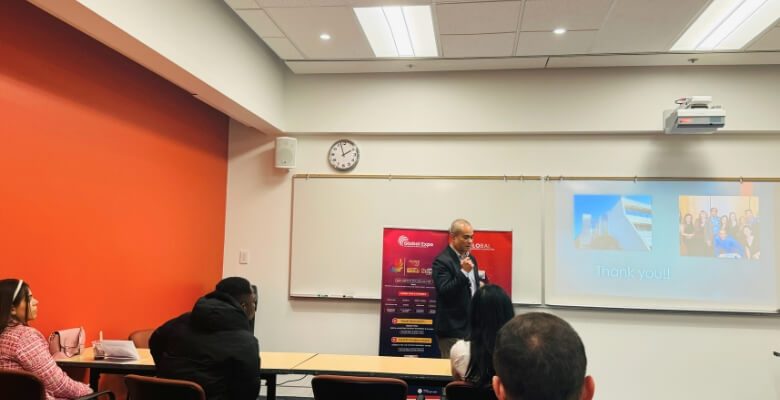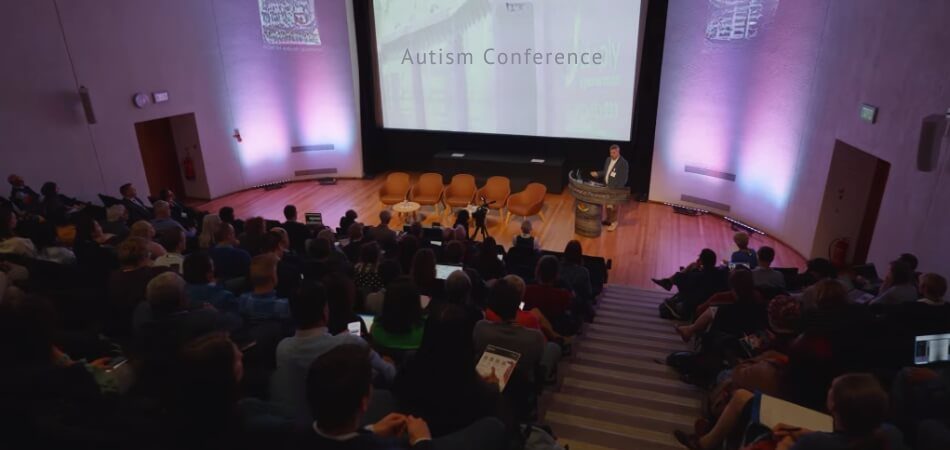Connecting with leading autism and disability studies experts can be an inspiring journey, especially at the autism and disability studies conference in Canada. For those in Sri Lanka looking to make this trip, knowing how to attend the autism and disability studies conference in Canada from Sri Lanka is essential to managing the process smoothly.
The best way to get started is to check the conference dates and register as soon as possible. Then, you will need an invitation letter from the conference organizers, which is essential for your Canadian visa application.
Upon receiving your visa approval, you can begin arranging your travel and accommodations. Prepare to engage yourself in enriching discussions and gain valuable knowledge from the conference sessions.
For a detailed step-by-step guide, continue reading our comprehensive article.
Who Can Attend the Autism and Disability Studies Conference in Canada?
The autism and disability studies conference in Canada attracts a wide range of attendees. During this event, participants will be able to exchange ideas and experiences. So knowing who can attend is essential for maximizing the benefits of this enriching experience. The following is a detailed explanation:
Professionals in the Field
Individuals working in education, healthcare, and social services should attend. When you join autism and disability studies conference in Canada you can gain insights from leading experts. Networking with peers can help build collaborative relationships, and this exchange of ideas helps develop professional practices.
Researchers and Academics
Academics engaged in autism and disability studies are highly encouraged to join. They can share their findings and learn from others. Presenting research findings can inspire further exploration. Engaging with various viewpoints enriches their academic pursuits.
Students and Early Career Individuals
Students pursuing degrees in related fields should seize this opportunity. This conference can provide valuable learning experiences. Interacting with seasoned professionals helps in career development. Their growth depends on exposure to real-world applications.
Advocates and Family Members
Advocates working for individuals with disabilities are also welcome. Their experiences can offer unique perspectives on the challenges faced. Family members of individuals with autism can share valuable insights. Their voices are essential in developing future policies and practices.
Policy Makers and Community Leaders
Individuals involved in policy-making or community leadership can benefit greatly. They play a significant role in shaping disability services and programs. Learning from attendees can help create informed policies. It is beneficial to collaborate with a variety of stakeholders to maximize community support initiatives.
Participating in an Autism and Disability Studies Conference in Canada- What Draws the International Attendees?
Autism and disability studies conferences in Canada provide international attendees with unique learning and networking opportunities. When you join autism and disability studies conference in Canada, professionals from around the world gather to exchange insights, share research, and explore the latest developments. Here’s what draws them to this valuable experience:
- Access to New Research: Attendees gain exposure to the newest findings in autism and disability studies, enhancing their knowledge. Insightful presentations by experts encourage further exploration in this evolving field.
- Networking with Global Experts: International professionals connect with researchers, practitioners, and advocates who share their passion. Building these relationships strengthens professional connections and fosters collaborative efforts worldwide.
- Learning Innovative Strategies: Practical sessions introduce attendees to effective strategies for autism and disability support. These approaches help in applying research directly to real-world scenarios.
- Inspiration from Keynote Speakers: Esteemed speakers share groundbreaking work and personal stories, inspiring the audience. These sessions offer valuable perspectives that resonate long after the conference ends.
- Cultural Exchange and Diversity: Diverse attendees contribute unique cultural perspectives on autism and disability. This exchange enriches understanding and encourages inclusive approaches to support and advocacy.
- Workshops for Practical Skills: Hands-on workshops help participants acquire new skills they can implement in their professional environments. These interactive sessions make learning tangible and immediately applicable.
- Exploring Canada’s Resources in Disability Support: Attendees see firsthand Canada’s advancements in disability inclusion and support services. This exposure offers insights into a highly developed framework for disability care.
- Opportunities for Future Collaboration: Many join autism and disability studies conference to find collaborators for ongoing or future projects. Partnerships like these can lead to long-term professional relationships as well as innovative research.
How to Attend the Autism and Disability Studies Conference in Canada from Sri Lanka?
You will have an excellent opportunity to expand your knowledge and network globally by attending the autism and disability studies conference in Canada. Proper planning is essential to ensure a smooth and successful experience when you join Canadian autism and disability conference from Sri Lanka. Follow these steps to make your journey to the conference hassle-free:
Step 1: Research the Conference Details
Knowing the conference’s schedule, location, and agenda helps in planning your attendance effectively. Look up the sessions, keynote speakers, and workshops that align with your interests. Knowing the conference dates early on allows you to begin preparations promptly. Make note of any deadlines for registration.
Step 2: Complete the Registration Process
Registering in advance secures your spot and often provides early-bird discounts. Carefully review the conference website for registration details, fees, and any documentation requirements. Completing this step ahead of time can help with visa processing. Make sure to keep a copy of your registration confirmation.
Step 3: Obtain an Invitation Letter from Organizers
An official invitation letter is crucial for your Canadian visa application, so request it as soon as you register. This document should detail the purpose of your visit and confirm your participation. Having the invitation letter adds credibility to your visa application. Ensure that it includes all necessary details for immigration authorities.
Step 4: Apply for a Canadian Visa
Applying for a Canadian visa is the next critical step; review the visa requirements specific to Sri Lankan citizens. Gather the required documents, including your passport, financial statements, and the invitation letter. Timely submission of the visa application is essential to avoid delays. Allow for processing time by applying well in advance.
Step 5: Arrange Travel and Accommodation
Once your visa is approved, book flights and accommodations near the conference venue for convenience. Look into hotels or homestays that are accessible and offer good connectivity. Early booking helps in finding affordable options and securing your preferred location. Check for any transport services the conference may provide.
Step 6: Prepare for an Engaging Conference Experience
Plan ahead to attend the sessions and workshops that interest you most, maximizing your learning experience. Networking opportunities with professionals can greatly improve your experience and lead to future collaborations. Bring business cards or materials relevant to your field. An open and proactive approach will help you make lasting connections.
Budgeting in Advance for Attending the Autism and Disability Studies Conference in Canada – Is it Beneficial?
Yes, budgeting in advance for attending the autism and disability studies conference in Canada is highly beneficial. Planning your expenses allows you to allocate funds carefully and avoid unexpected costs. Setting a budget lets you prioritize essentials, like travel, accommodation, and registration fees, for a smooth experience.
Furthermore, budgeting ahead enables you to plan for attending autism and disability conference in Canada while exploring affordable travel and lodging options before prices increase. Finding deals on flights and accommodations is easier when you have a clear budget in mind. By organizing your finances early, you can focus on enjoying the conference without financial stress.
A clear budget further ensures you can invest in extra experiences, like workshops or networking events. These additional sessions can enhance your knowledge and professional connections. Having financial preparation gives you the confidence to fully embrace all that the conference offers.
Maximizing Your Experience at the Autism and Disability Studies Conference – Tips to Follow
You will have the opportunity to gain valuable knowledge and build meaningful relationships at the autism and disability studies conference. To make the most of this experience, you have to approach it with a plan. Here are key tips to help you maximize every moment:
- Plan Your Sessions in Advance: Review the conference agenda to select sessions that align with your interests. Prioritizing topics ensures you don’t miss valuable insights.
- Engage with Keynote Speakers: Take the time to attend keynote sessions led by field experts. Their experiences and insights can provide a unique perspective on important issues.
- Network Actively with Fellow Attendees: Introduce yourself to other participants and share your professional background. Building connections with peers fosters collaboration and learning opportunities.
- Take Notes for Future Reference: Bringing a notebook or device for notes helps you capture essential ideas. Written notes will serve as valuable reminders post-conference.
- Participate in Interactive Workshops: Workshops offer hands-on experience and practical skills to apply in your work. Engaging fully in these sessions enhances your learning experience.
- Visit Exhibit Booths for Resources: Explore exhibit areas featuring tools, resources, and services relevant to autism and disability support. These resources can benefit your practice directly.
- Ask Questions During Q&A Sessions: Prepare questions beforehand to make the most of Q&A opportunities. Inquiring about specific topics deepens your understanding of critical subjects.
- Follow Up with New Contacts: After the conference, send follow-up messages to professionals you connected with. Continuing these relationships can lead to future collaborations.
FAQs About How to Attend Autism and Disability Studies Conference in Canada from Sri Lanka?
As a Sri Lankan attending the autism and disability studies conference in Canada, there are several steps and preparations involved. To help attendees manage the process, we’ve gathered a list of frequently asked questions that cover essential details beyond what’s discussed in the main guide:
Is Travel Insurance Recommended for International Attendees?
Yes, it’s strongly recommended to have travel insurance to cover unexpected health, travel, or accommodation issues. Many attendees find insurance valuable in case of medical emergencies or unexpected delays, ensuring a stress-free experience.
What Is the Dress Code for The Conference?
The dress code is typically business casual, allowing for a professional yet comfortable appearance. Participants are encouraged to dress formally for networking events but can opt for more comfortable clothing during workshops and informal sessions.
How Can I Find Local Transportation Options Near the Venue?
Research transportation options like taxis, buses, and rideshares near the conference location. The event’s website may offer recommendations or discounts on transit passes, making it easier to navigate Canada during your stay.
Will There Be Opportunities to Attend Virtual Sessions?
Some conferences offer hybrid options with both in-person and virtual sessions, allowing greater flexibility for attendees. If in-person attendance isn’t possible, check the conference website to see if remote participation is available for key sessions.
How Can I Stay Updated on Post-Conference Opportunities or Resources?
Follow the conference’s social media channels or join any provided mailing lists to stay informed on resources shared after the event. These updates can include session recordings, follow-up webinars, or future event invitations, extending your learning experience.
Bottom Line
An autism and disability studies conference in Canada can be a life-changing experience for Sri Lankans, opening new doors to knowledge, collaboration, and new perspectives. Taking the time to prepare early and understanding each step of the process will make your journey more smooth and enjoyable.
If you know how to attend the autism and disability studies conference in Canada from Sri Lanka, you can handle essentials like obtaining a visa, securing an invitation letter, and making travel arrangements. Besides that, budgeting for your trip and organizing your schedule ensure you can focus on the enriching sessions and networking opportunities.
Take advantage of every session, workshop, and conversation to maximize your experience. With careful planning and an open mind, this conference can inspire growth, professional connections, and deeper insights into autism and disability studies.








